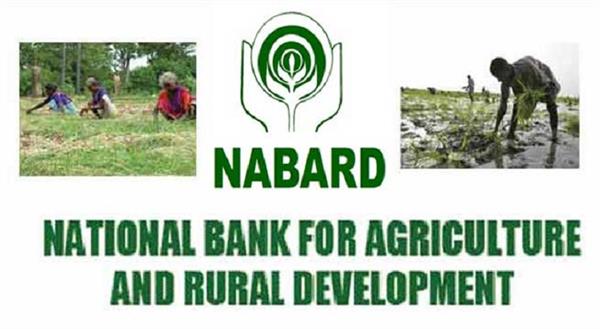NABARD: Bank for Rural India

India is a country where the importance of the agricultural sector to the economy is much higher than the global average. 60 percent of the population relies on agricultural goods, but there is still a shortage of funding for farmers and rural people who engage in small-scale development or start small-scale jobs. To lift their living, people in rural areas either need credit or the right path to do something, but they are failing in both cases.
Government of India, in order to overcome the problems faced by rural people, founded NABARD, to provide credit insurance to these people for agricultural credit, knowledge development and other activities.
What is NABARD?
NABARD is a development bank that focuses mainly on the rural sector of the country. It is India's apex development bank and one of the country's most important organisations. It is responsible for the production of small factories, cottage industries and all other village or rural ventures of this nature.
It was established on 12 July 1982 as a key or supreme institution for the financing of the agricultural sector under the Act of Parliament.
Mission of NABARD
NABARD which stands for-National Bank for Agriculture and Rural Development is one of the government-owned institutions, which only seeks to provide development credit in rural areas and relies on the mandate to 'promote prosperous and inclusive agriculture and rural prosperity with effective credit support for institutional development, creative initiative and services.'
Thus the goals of NABARD can be taken under three main headings:
● Credit roles
● Development purpose
● Promotional functions
Role of NABARD
1. It is the highest institution that has the capability to control all policy, planning and lending operations related to agriculture and other economic activities in rural areas.
2. It is based on the model of the refinancing agency for those institutions providing production and investment credit to support a number of rural development initiatives and programs. These institutions shall be as follows:
● Regional rural banks (RRBs),
● Commercial banks (CBs)
● Other financial institutions approved by RBI.
● State cooperative agriculture and rural development banks,
● State co-operative banks (SCBs)
3. It enhances its lending potential in India, which includes monitoring, the creation of recovery programmes, the consolidation of financial institutions and the employee training.
4. It coincides with the preparation of rural credit funding of all kinds of institutions engaged in development work at the ground level, while maintaining contact with the State Government, the Central Government and also with RBI and other nationwide institutions dealing with policy-making and credit-making.
5. It also distributes and prepares rural credit plans for all districts in the country on an annual basis as required.
6. It also aims to support the study and training period in rural banking, agriculture and rural development.
7. In addition to this, NABARD also undertakes a natural resource management policy such as tribal development and a watershed protection programme
Some of the benchmarks in NABARD's practices are as follows:
Operations of business:
1. Production Credit: NABARD has accepted an accumulation of Rs.13.66 lakh crore short-time period loans to Cooperative Banks and Regional Rural Banks (RRBs) all through 2019-20,this was backed by refinance support of Rs.2.25 lakh crore.
2.Investment Finance: Investment Credit for capital accumulation in agriculture & associated activities, non-farm commercial enterprise activities and offerings to banks, RRBs and co-operative banks reached a stage of 9953 crores this year.
3. Rural Infrastructure Development Fund (RIDF):NABARD had sanctioned ₹65,838 crore as loan during 2019-20 for various infrastructure projects under agriculture and irrigation, roads and bridges, social sectors, etc. Disbursement against ongoing projects was ₹56,432 crore during the year. Additionally, irrigation potential was augmented by 34.63 lakh ha through 99 projects under the Long-Term Irrigation Fund (LTIF). Committing to promote water use efficiency, NABARD operationalised the Micro Irrigation Fund (MIF) in 2019-20 with a corpus of ₹5000 crore.
Fresh Initiatives of Business:
● During the year, NABARD has promoted a new subsidiary, NABFOUNDATION to implement developmental initiatives in partnership mode. NABARD continued providing hand holding, capacity building and institutional development support to the Cooperative Credit Structure and Regional Rural Banks.
● In their endeavour to further strengthen the cooperative structure, a comprehensive package for development of the Cooperatives has been rolled out during the current year, that would facilitate transformation of Primary Agricultural Credit Societies (PACS) into Multi Service Centres (MSCs) and enable PACS to achieve their long-standing dream of computerising their operations.
● NABARD has taken initiatives to guide weak cooperative banks on turnaround strategies.
● Frauds in banks is an area of concern for NABARD and in order to strengthen the operational risks faced by Cooperative Banks, NABARD has rolled out a pilot scheme on implementation of Fraud Risk Management Software (FRM) in 8 Rural Cooperative Banks. They have also developed a Fraud Vulnerability Index (VINFRA) that helps banks to self-sensitise their vulnerability to frauds.
Lets Summarize
NABARD is key to the growth and efficacy of the new rural credit scheme. Around half of the loans in the rural area come from cooperative banks and central rural banks. NABARD is responsible for governing and managing the operation of those banks. Over the years, NABARD has been pressing for the creation of loan systems for rural communities to fulfil their current credit criteria.
Apart from fulfilling the credit needs of the rural market, NABARD is also influential in social developments and initiatives. Partners with numerous organisations for a variety of groundbreaking initiatives such as the SHG-Bank connect, innovative water and soil conservation schemes. Over the last three decades, the institution has built trust and faith in farmers and rural communities.